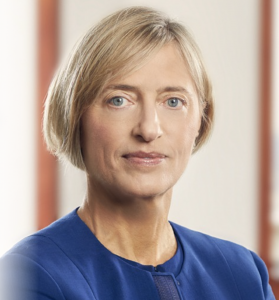Written By: Courtney Fernandez
Julie North is a recently retired partner of Cravath, Swaine & Moore LLP (“Cravath”). Born in Canberra, Australia, Julie moved to New York when she was five years old and grew up in Saranac Lake, New York. She received a B.A. cum laude from Hamilton College in 1984 and her J.D. magna cum laude from Syracuse University College of Law in 1989. During both of her degree programs, Julie sharpened her oral argument, critical thinking, and problem-solving skills. She credits both for teaching her the basic skills that all attorneys need to succeed.
As the Notes and Comments Editor of the Syracuse Law Review, Julie welcomed the challenge of helping fellow members write successful notes, as well as making hard decisions about which student notes to publish. Julie also embraced the intense shared experience of working on a team with other smart and dedicated law review members to create the best work product possible in a condensed timeframe.
Julie recalls knowing within the first twenty minutes of her initial interview with Cravath that it would be an ideal place to begin her professional legal career. Luckily, Cravath likewise saw the potential in Julie. She started her career there as a first-year associate in 1989, became a partner in 1997, and practiced there until her retirement in December 2021.
As an associate, Julie worked on intellectual property, mergers and acquisitions, arbitrations, and securities matters. Julie continued to work on a diverse range of matters as a partner, but focused on anti-trust advisory work in the last several years at the firm. During her time at Cravath, she enjoyed the shared experiences of a team environment much as she enjoyed the teamwork on Syracuse Law Review.
Julie found it gratifying to work on extremely complicated procedural and legal issues, particularly when the matters involved multiple parties. Julie advises young attorneys working on complicated litigation matters to take the time to learn and marshal the facts. She analogized the beginning of a case to being dealt a hand of cards. Over time your hand—the facts, and your theories—change. Witnesses become unavailable, documents become more or less relevant, the court makes procedural and substantive decisions – you must be able to stay on top of and manage your case as it develops. To do this, you have to make the time to learn and understand your—and your opponent’s—case inside-out.
For law students struggling with decisions about what area of law to focus on, Julie recommends seeking out summer externships and informational interviews. Julie suggests that law students try to understand the day-to-day work of a practice area. In particular, Julie recommends that law students ask the who, what, when, where, and why of the day-to-day of the lawyers they speak to: (1) who does the attorney speak with when they pick up the phone; (2) what documents does the attorney draft; (3) when does the attorney go to court, if ever. Julie also suggests that law students speak with junior, mid-level, and senior attorneys to get an understanding of the projects they are working on and the skills they are developing.
Looking towards the future and next generation of attorneys, notwithstanding the advantages that technology provides, Julie hopes that young lawyers get in-person, face- to-face experience. She believes it is easier to teach—and learn—when people are in the room together. She also believes that being in the office makes the demands of the legal profession easier, or even enjoyable. This goes back to the esprit de corps that comes from shared intense experiences. She also believes it is easier to find mentors and sponsors. Julie urges young lawyers to find seasoned professionals whose judgment they can trust when they need advice about navigating those inevitable challenges that arise. Julie encourages young lawyers to finding mentors and advocates who look like them and those who do not. Your opportunities as a lawyer (and in life) can come from a multitude of people. The more diverse the people in your corner are, the more diverse your opportunities will be.

